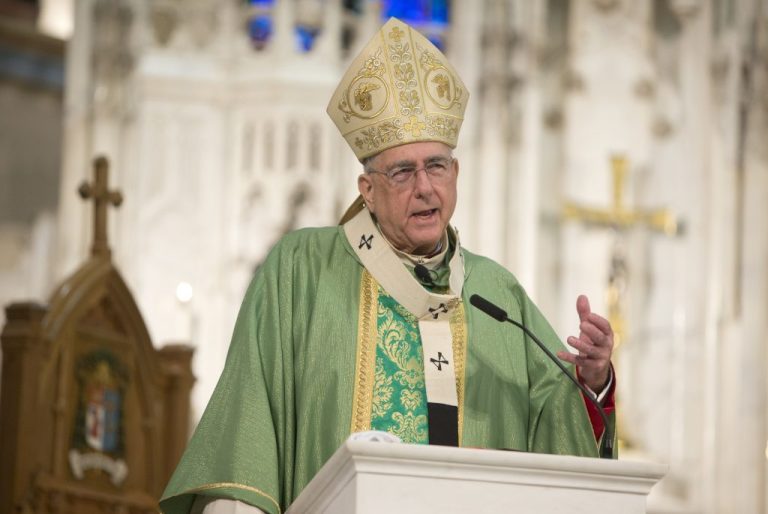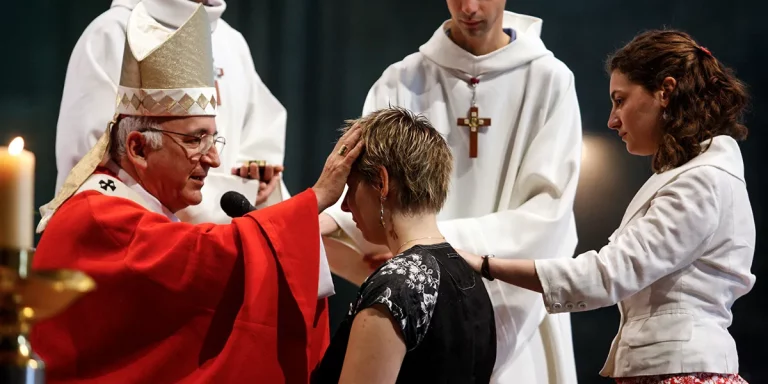Why do Catholics pray to Mary?
As a pastor, both Catholics and non-Catholics frequently ask me why we pray to Mary. Some see asking the Mother of Jesus to pray for us as unnecessary or even wrong. However, praying to Mary has been an essential part of Catholic spirituality since the earliest days of the Church. Here’s a look at the biblical roots of this practice and why it remains an important devotion today.
The Intercession of Saints
The Catholic practice of asking the saints and Mary to pray for us has its roots in the doctrine of the Communion of Saints. This biblical teaching states that all believers, both those on earth and those in heaven, are united together in one body with Christ as the head (Hebrews 12:22–24). The saints in heaven are aware of and care about what happens on earth (Revelation 6:9–11). They join their prayers with ours, interceding for us before God (Revelation 8:3–4).
When we ask Mary to “pray for us,” we’re simply asking our spiritual mother to join her prayers to ours. We’re not praying to her as we would to God. In Catholic teaching, prayer directed to God is qualitatively different from prayer asking for the intercession of the saints. Only God answers our prayers directly. Mary and the saints join their prayers to ours and present them, along with their merits, before God’s throne.
Mary’s Unique Role
As the Mother of Jesus, Mary has a unique role in God’s plan of salvation and a special closeness to her Son. At the Annunciation and her fiat (“let it be done to me”), she played an instrumental part in humanity’s redemption (Luke 1:38). At the foot of the cross, Jesus gave Mary to John—and to all believers—as our spiritual mother (John 19:26–27). At Pentecost, she joined the apostles in prayer as the church was born (Acts 1:14).
Mary’s role as Jesus’ mother and the spiritual mother of all believers gives her immense spiritual authority. As our mother, she cares deeply about our spiritual well-being. As the perfect disciple who always does the Father’s will, her prayers have great efficacy. Mary constantly points us to her Son and wants to nurture our relationship with Christ. Asking for her intercession acknowledges her vital spiritual motherhood.
History of Marian Devotion
From the beginning, Christians showed great honor and love for Mary. Writings from the early Church show devotion to Mary, present from Christianity’s earliest days. As the recognized Mother of Jesus and spiritual mother of His followers, asking for her intercession through prayer was a natural outgrowth of early Christianity.
By the 4th century, regular Marian feasts existed. The earliest evidence of prayers directed to Mary dates back to the 3rd century. Perhaps most significantly, in 431 AD, the Council of Ephesus affirmed Mary as theotokos, the Mother of God. This solemnly defined a role the faithful had long ascribed to her from the beginning. Her perpetual virginity—before, during, and after birth—was likewise affirmed, dating back to the earliest church.
Over time, Marian doctrine and devotions upheld by the Catholic Church simply articulated the love and honor the faithful had always shown her from the beginning. As the human portal God used to take on flesh and enter our world, Catholics recognize Mary as unique among God’s creation. Praying for her intercession has apostolic origins and continues to be an integral part of Catholic spirituality today.

The Biblical Case for Marian Devotion
While the clearest roots of Marian prayer come from early Church tradition, scripture makes a solid case for asking the Mother of Jesus to pray for us:
- Mary’s vital importance is evident throughout the Gospels, especially her fiat, which made humanity’s redemption possible. Her words at the Annunciation illustrate her extraordinary faith.
- In the Gospel of John, Jesus performs his first public miracle after a request from Mary, despite saying “my hour has not yet come” (John 2:1–11). This signals Mary’s powerful intercessory role.
- As Jesus suffered and died on the cross for our salvation, he gave Mary as a spiritual mother to all believers (John 19:25–27). Honoring his mother becomes part of honoring Jesus.
- In Revelation 12, Mary appears as a central figure in salvation history. Verses 16–17 specifically mention the dragon’s wrath toward “the rest of her offspring.” According to Catholic interpretation, these spiritual offspring are the Church—all who keep God’s commandments.
- Whenever groups of Christians gathered to pray in the New Testament, they interceded for one another. Asking Mary to join her prayers with ours continues this scriptural practice of petitioning fellow believers for prayer (James 5:13–16).
Mary as an Example of Holiness
In addition to her special role in salvation history, Mary serves as the ultimate model of what it means to be Christ’s disciple. The Church calls her “the supreme model of perfection of faith and life for all Christians” (Lumen Gentium 65).
Here are just some of the Marian qualities we’re called to imitate as followers of Jesus:
- Exceptional faith, from the Annunciation to the cross to Pentecost. Mary’s faith never wavered, even when her son’s path no longer made sense.
- Obedience: Mary listened to God and always said yes to His will, even when it required a great sacrifice of her own plans and dreams.
- Humility: despite her great calling, Mary thought of herself as the lowly “handmaid of the Lord” (Luke 1:38).
- Reflection on spiritual things (Luke 2:19) Mary continually pondered the meaning of events, great and small.
- Persevering prayer, from calling down the Holy Spirit with the disciples in the Upper Room to her constant intercession for us now in eternity,.
Mary lived these virtues to an extraordinary degree. As such an exemplary follower of Christ, Catholics feel great confidence in asking for her heavenly help.
The Heart of Marian Devotion
It’s important to remember that honoring Mary is ultimately about honoring her son, Jesus. By getting to know and love Mary better, we grow closer to the Christ she carried in her womb, raised as her own, and accompanied to the cross as the “woman” of John’s Gospel.
Pope Benedict XVI once wrote, “Looking upon Mary, we come to believe once again in the revolutionary nature of love and tenderness.” In our world full of distractions and ever-changing values, her quiet witness of faith, obedience, humility, and prayer still calls people to her Son today.
There’s an old saying, “To Jesus, through Mary.” The heart of Marian devotion follows just that. Through and in Christ’s mother, we draw nearer to our Savior himself.
I hope this look at Catholic teaching helps explain why we have such love for Mary and feel great confidence in turning to her motherly help. As the perfect model of Christian discipleship and first among the saints, our spiritual mother constantly points us to Jesus. Her prayerful intercession and witness to the gospel remain just as powerful today.







